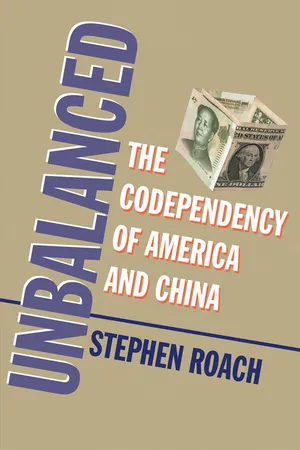
- 288 pages
- English
- PDF
- Available on iOS & Android
About this book
The Chinese and U.S. economies have been locked in an uncomfortable embrace since the late 1970s. Although the relationship initially arose out of mutual benefits, in recent years it has taken on the trappings of an unstable codependence, with the two largest economies in the world losing their sense of self, increasing the risk of their turning on one another in a destructive fashion.
In Unbalanced: The Codependency of America and China Stephen Roach, senior fellow at Yale University and former chairman of Morgan Stanley Asia, lays bare the pitfalls of the current China-U.S. economic relationship. He highlights the conflicts at the center of current tensions, including disputes over trade policies and intellectual property rights, sharp contrasts in leadership styles, the role of the Internet, the recent dispute over cyberhacking, and more.
A firsthand witness to the Asian financial crisis of the late 1990s, Roach likely knows more about the U.S.-China economic relationship than any other Westerner. Here he discusses:
- Why America saving too little and China saving too much creates mounting problems for both
- How China is planning to re-boot its economic growth model by moving from an external export-led model to one of internal consumerism with a new focus on service industries
- How America, shows a disturbing lack of strategy, preferring a short-term reactive approach over a more coherent Chinese-style planning framework
- The way out: what America could do to turn its own economic fate around and position itself for a healthy economic and political relationship with China
In the wake of the 2008 crisis, both unbalanced economies face urgent and mutually beneficial rebalancings. Unbalanced concludes with a recipe for resolving the escalating tensions of codependence. Roach argues that the Next China offers much for the Next America—and vice versa.
Frequently asked questions
- Essential is ideal for learners and professionals who enjoy exploring a wide range of subjects. Access the Essential Library with 800,000+ trusted titles and best-sellers across business, personal growth, and the humanities. Includes unlimited reading time and Standard Read Aloud voice.
- Complete: Perfect for advanced learners and researchers needing full, unrestricted access. Unlock 1.4M+ books across hundreds of subjects, including academic and specialized titles. The Complete Plan also includes advanced features like Premium Read Aloud and Research Assistant.
Please note we cannot support devices running on iOS 13 and Android 7 or earlier. Learn more about using the app.
Information

Table of contents
- CONTENTS
- PREFACE
- PART ONE. IN THE BEGINNING
- 1. The Political Economy of False Prosperity
- 2. Who Depends on Whom?
- PART TWO. LEADERSHIP AND POWER
- 3. The Boss and the Maestro: Greenspan and Zhu
- 4. The Great Stability Debate: Wen vs. Bernanke
- 5. Two Takes on Strategy
- PART THREE. TENSIONS
- 6. A New Globalization
- 7. Bilateralism in a Multilateral World
- 8. The China Gripe
- PART FOUR. WARNING SHOTS
- 9. Imbalances and the Great Crisis
- 10. Smoot-Hawley Redux
- PART FIVE. RESOLUTION
- 11. Rebalancing
- 12. The Next America Meets the Next China
- 13. Codependency, the Internet, and a Dual Identity Crisis
- Notes
- Acknowledgments
- Index